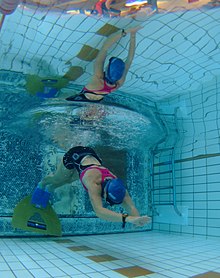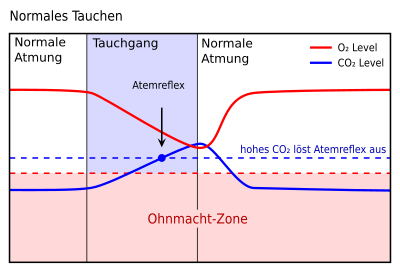Swimming pool blackout
A SWB is a sudden loss of consciousness under water during apnea - diving (diving without breathing apparatus).
In the ascent blackout , unconsciousness occurs during a deep dive during the ascent prior to exiting.
process
Respiratory stimulus is in the normal state by increasing carbon dioxide - partial pressure in the arterial blood triggered. When breathing is interrupted , e.g. B. During diving, the carbon dioxide level in the blood increases and the breathing stimulus becomes stronger. If the carbon dioxide partial pressure exceeds a certain value, one breath takes place (even if unconscious). A simultaneous decrease in the oxygen partial pressure in the blood causes unconsciousness.

You can suppress this stimulus through training, but you can only delay the forced breath and not train it off. If the carbon dioxide level in the blood is drastically reduced by increased, conscious breathing before the dive ( hyperventilation ), the strength of the breathing stimulus increases accordingly more slowly. The forced breath can be delayed by up to a few minutes. However, the hyperventilation before the dive increases the oxygen content in the blood only insignificantly.
During the dive, the carbon dioxide content (CO 2 ) increases, with the oxygen content (O 2 ) falling steadily due to consumption. Since the apnea diver is not breathing, the CO increases 2 - partial pressure in arterial blood - from a normal value of about 53 mbar - continuously to about 80 mbar. Above this value, the breathing stimulus becomes so strong that one appears (long) before unconsciousness and breathes consciously. Hyperventilation can reduce the CO 2 partial pressure in the arterial blood to 20 mbar, which greatly delays the onset of the respiratory stimulus. If the oxygen partial pressure in the arterial blood falls below the threshold of about 40 mbar at the same time, then, due to a lack of oxygen in the neural tissue (nervous system), unconsciousness occurs without any warning.
If the unconscious occurred while the head was in the water, this breathing stimulus inevitably leads to a breath under water. However, the aspiration of water is prevented by the immediately onset of glottic spasm . Nevertheless, the diver should be brought to the surface of the water as soon as possible in order to avoid further complications.
The term swimming pool blackout can be explained by the fact that many divers hyperventilate in the leisure pool before attempting a dive (due to the false assumption that more oxygen enters the blood through fast and deep breathing) and therefore do not appear in time due to a lack of intense breathing stimulus. The diver suddenly becomes unconscious in the water and is exposed to the risk of drowning .

|

|
The CO 2 tolerance varies greatly from person to person and is more pronounced in trained divers than in beginners. In trained divers, this can lead to a “swimming pool blackout” even without prior hyperventilation.
Promotion blackout

A special form of the swimming pool blackouts is when apnea deep diving occurring ascent blackout . Apnea diving means that sometimes technical aids - but without breathing apparatus - are used to try to reach the greatest possible depth.
Due to the increased ambient pressure when diving, the volume of air in the lungs decreases significantly. The breathing air is compressed. This increases the oxygen partial pressure in the breathing air. This enables an increased oxygen saturation or an increased partial pressure of O 2 in the blood. During apnea, oxygen is metabolized into carbon dioxide. If the apnea diver reappears, the breathing air expands again, the O 2 partial pressure in the breathing air decreases and oxygen dissolved in the blood diffuses back into the breathing air. This effect leads to insufficient oxygen saturation of the blood, especially in the last 10 meters and the associated doubling of volume. This deficiency solves u. U. unconsciousness without any warning.
rescue
Divers should be constantly monitored while exercising in the swimming pool, as loss of consciousness occurs suddenly. Symptoms are: uncontrolled, twitching movements under water, sudden release of breath, sudden motionless floating in the water.
Activities:
- Immediately bring your mouth and nose over water (before breathing begins).
- Check breath → cardiopulmonary resuscitation
- Emergency call
- Heat retention
- Stable lateral position and observation
The emergency doctor treats the patient with oxygen and adrenaline or noradrenaline. The patient then receives intensive medical care in the hospital.
consequences
The insufficient supply of oxygen can cause cells to irreversibly die. The swimming pool blackout can cause various symptoms in retrospect, such as headaches, palpitations, cramps and shortness of breath. If the oxygen supply has been interrupted for too long, the patient falls into a coma or death occurs.
See also
Other diving accidents are barotrauma , CO 2 poisoning , deep intoxication .
Web links
- Swimming pool blackout on the website of the Society for Diving and Hyperbaric Medicine
- Andreas Nowotny: The swimming pool blackout ( Memento from June 3, 2013 in the Internet Archive ) (private website).